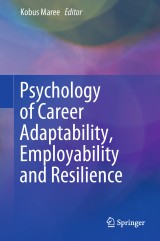Details

Psychology of Career Adaptability, Employability and Resilience
|
213,99 € |
|
| Verlag: | Springer |
| Format: | |
| Veröffentl.: | 05.12.2017 |
| ISBN/EAN: | 9783319669540 |
| Sprache: | englisch |
Dieses eBook enthält ein Wasserzeichen.
Beschreibungen
This book examines how the career counselling profession should respond to the changes in the world of work that have resulted from the increasing need to communicate faster and disseminate information more efficiently. It emphasizes the twin aims of enhancing a persons’ career adaptability and helping them to become more employable, rather than linearly trying to find a job and remaining in one organisation for their entire career-lives. The book shows that, to achieve these aims, people need to acquire career resilience, especially since the world of work no longer provides workers with work-holding environments for the duration of their career-lives. It takes into account historical analyses which show that whenever major technological change has occurred and widespread job losses have ensued, people have managed to use the new technology to create new employment opportunities. Readers from career psychology and management research, vocational and professional career coaching, and students of career psychology will find this book delivers sound, updated theory demonstrating how perceived threats in the 21st century can conceivably be turned into opportunities. <p></p>
<p>Part 1: Introduction.- Foreword.- Part 2: Conceptualising career adaptability, employability, and career resilience.- Career adaptability: Theory and philosophy.- The foundations of career resilience.- Life designing dialogues and resilience.- The importance of career adaptability, employability, and career resilience in designing a successful life.- Part 3: Assessing career adaptability and career resilience.- Assessing career adaptability.- Measuring employability.- Determining career resilience.- Part 4: Advancing career adaptability, employability, and career resilience in career counselling across the life-span.- Facilitating adaptability and resilience: Career counselling in resource-poor communities in South Africa.- Counselling adolescents to be career adaptable and career resilient.- Counselling young adults to become career adaptable and career resilient.- Counselling adults to become career adaptable and resilient.- Part 5: Utilising career adaptability, employability, and career resilience to manage transitions.- Drawing on career adaptability, employability and resilience to help children manage the early school years.- Using the dialogical concept of the “architecture of life space” in facilitating career adaptability, resilience and coping with transitions.- Career adaptability, employability, and career resilience in managing school-to-work transitions.- Part 6: Promoting the career adaptability, employability, and career resilience in special populations.- Promoting the career adaptability, employability, and career resilience in LGBT individuals.- Promoting the career adaptability, employability, and resilience of women.- Career adaptability, employability, and career resilience of Asian people.- Part 7: Drawing on career adaptability, employability, and career resilience to promote social justice.- Harnessing/ Utilizing life design to promote decent work.- Toward a career self-determination theory.- Utilizing career adaptability and career resilience to promote employability and decent work and alleviate poverty.- Career adaptability and context.- Relationship mapping for resilience and career adaptability in challenging contexts.- Career Adaptability and career resilience: the roadmap to work inclusion for individuals experiencing disability.- Fostering Career Adaptability and Resilience and Promoting Employability using Life Design Counseling.- Part 8: Epilogue.</p>
<p>Prof. Maree is a Professor in the Department of Educational Psychology at the University of Pretoria. His main research interests are career counseling, career construction (counseling), life design (counseling), emotional-social intelligence and social responsibility, and learning facilitation in mathematics. He links research results to appropriate career choices and to life designing. </p><p><br/></p><p><br/></p><p><br/></p><p><br/></p><p><br/></p><p><br/></p>
This book examines how the career counselling profession should respond to the changes in the world of work that have resulted from the increasing need to communicate faster and disseminate information more efficiently. It emphasizes the twin aims of enhancing a persons’ career adaptability and helping them to become more employable, rather than linearly trying to find a job and remaining in one organisation for their entire career-lives. The book shows that, to achieve these aims, people need to acquire career resilience, especially since the world of work no longer provides workers with work-holding environments for the duration of their career-lives. It takes into account historical analyses which show that whenever major technological change has occurred and widespread job losses have ensued, people have managed to use the new technology to create new employment opportunities. Readers from career psychology and management research, vocational and professional career coaching, and students of career psychology will find this book delivers sound, updated theory demonstrating how perceived threats in the 21st century can conceivably be turned into opportunities. <p></p>
Brings together the views of academics, career counselling theorists and practitioners Combines the three constructs of career adaptability, employability, and career resilience Presents perspectives and theory on how to deal with workplace transition insecurity Includes supplementary material: sn.pub/extras
<p>Brings together the views of academics, career counselling theorists and practitioners</p> <p>Combines the three constructs of career adaptability, employability, and career resilience</p> <p>Presents perspectives and theory on how to deal with workplace transition insecurity</p> <p><br/></p>

















